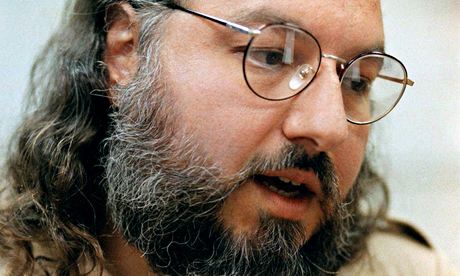US 'may release Israeli spy Jonathan Pollard to kickstart peace process'
Agent held since 1985 could be freed in deal to persuade Israel to press on with a planned release of Palestinian prisoners

Jonathan Pollard, seen in this 1998 file photograph, reportedly does not wish to be released in exchange for Palestinian prisoners. Photograph: Karl Deblaker/AP
Jonathan Pollard, serving a life sentence in a US jail for spying for Israel, could be released as part of a putative "grand bargain" to breathe new life into the stalled Middle East peace process.
Speculation that Pollard's release was being seriously considered by the US re-emerged on Monday as the US secretary of state, John Kerry, flew to the Middle East for the second time in a week for urgent meetings with the Israeli prime minister, Binyamin Netanyahu, as the peace talks appeared at crisis point. He is to return on Wednesday for talks in Ramallah with the President Mahmoud Abbas.
Kerry has been spearheading efforts to find a way out of the current deadlock in the US-sponsored Middle East peace process, which was restarted eight months ago, after Israel failed to release a fourth group of long-term Palestinian prisoners being held in its jails. It had previously agreed to release the group at the weekend.
Israel had been seeking a guarantee that the Palestinians would not immediately abandon the latest round of talks when the original deadline for negotiating a framework agreement expires on 29 April.
According to a US official quoted by Haaretz newspaper: "The key would be a big US concession for a big Israeli concession." Pollard has served 29 years of a life sentence and is not due for consideration for parole until next year.
Separately the New York Times quoted an official suggesting that Pollard's release was under consideration, although no decision had been taken.
Kerry and Barack Obama have made huge efforts and placed US credibility on the line in their attempts to resuscitate the peace process and usher in a two-state solution. However, hopes that both sides could be persuaded to sign up to a framework agreement that would lay the ground work for substantive talks on the key issues – including the future of Israeli settlements in the West Bank, the status of Jerusalem and the right of return of Palestinian refugees – have hit a series of obstacles.
At present the talks are blocked over efforts to find a way to continue the period of negotiations beyond the end of April.
On the Palestinian side, officials are insisting that Israel abide by its agreement over the scheduled prisoner release, which they say must not be linked to an extension of the talks deadline.
Abbas has been seeking US mediation, including by Obama, for the release of three of the most prominent Palestinian prisoners including, most significantly, senior Fatah leader Marwan Barghouti.
However, sources close to the talks suggested overnight that Pollard's release was being linked to a potential deal that would see a much larger release of Palestinian prisoners – up to 400 – and an unofficial freeze on Israeli settlement construction in the occupied West Bank and east Jerusalem in exchange for both sides agreeing to extend the April deadline.
Pollard's release as part of such a deal, however, is being opposed by some of his most prominent supporters including the hardline Israeli housing minister, Uri Ariel, a member of Netanyahu's cabinet.
Ariel told Israel's Army Radio that Pollard did not want to be freed from a US jail in exchange for Palestinian prisoners, saying people close to the convicted spy had told him that Pollard opposed such a "shameful deal".
Ariel's comments echo similar remarks made to the Guardian last week by the Knesset's deputy speaker, and long-term campaigner on Pollard's behalf, Moshe Feiglin. He has visited Pollard in jail and has long insisted that he would refuse to be released in exchange "for terrorists".
Realistically, however, he is unlikely to have any say in the circumstances of his release.
Pollard, who was arrested in 1985, was a civilian intelligence analyst for the US navy when he gave classified documents to Israeli handlers. He was granted Israeli citizenship in 1995.
Kerry met Netanyahu for several hours late on Monday before sitting down with him again on Tuesday morning before his scheduled departure for Brussels for Nato talks on Ukraine, he did not meet Abbas, instead holding talks with Palestinian negotiator Saeb Erekat.
US defence and intelligence officials have long argued against releasing Pollard. The president and his predecessors have refused to release him despite pleas from Israeli leaders.
On Monday, White House spokesman Jay Carney declined to discuss any possible deal.
No comments:
Post a Comment
Thanks for commenting. Your comments are needed for helping to improve the discussion.